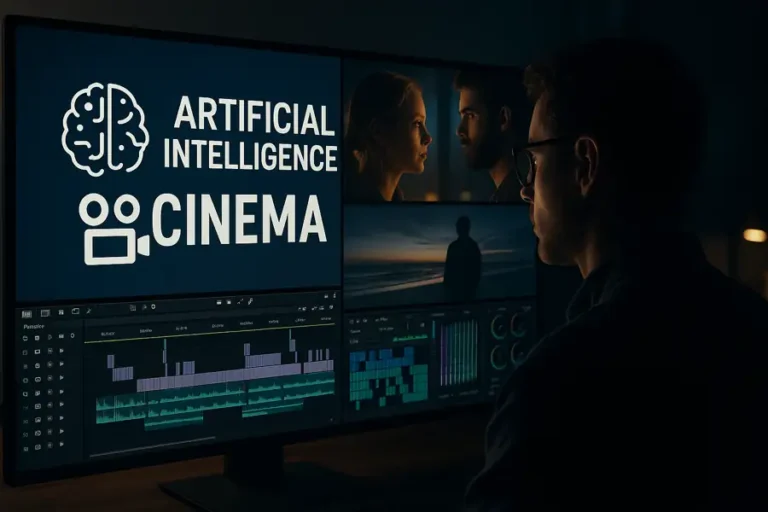
In 2025, cinema is not what it used to be. Artificial intelligence has rewritten the rules of industrial cinema as well as art house cinema. But perhaps it is not even what we thought it would become. Artificial intelligence has gone through every stage of the production process without fanfare, but with disruptive force. It is no longer a support: it is presence. It is proposal. It is decision-making.
We at Top Ten Ai don't use these tools to play games, but to rethink our way of filmmaking. Today I can create, edit, refine an entire film project -- by myself. The question is: Is it still cinema if a machine does it together with you?
Midjourney, Runway, Kaiber, ChatGPT, ElevenLabs, Aiva, Sudowrite, Scriptbook, Sensei, Topaz--they are not just tools in our arsenal. They are part of our creative process. And when you get them working together, when you learn how to orchestrate this ecosystem of intelligences, you can do things yourself that used to require a whole crew. Is that better? Sometimes yes. Faster, freer, more radical. Is it worse? Also. Because the risk is that by dint of always having everything ready, you lose that constructive tension of confrontation, that fertile conflict that only arises in group work.
AI does not contradict you. It doesn't ask you, "Are you sure?" And that, over time, changes you.Today I edit video in an afternoon that would have taken me days before. I create visuals from prompts, regenerate scenes, adapt a voice in three languages with ElevenLabs without going through the room. Yet, every now and then, I miss that room. I miss the real voice that gets the tone wrong. The line that sounds wrong but then gets right. I miss the downtime where insights are born.
We write texts with Sudowrite that look like they were built by a team. But that "look like" is the key word. Because writing well doesn't always equate to saying something alive. Every time I use a tool to have storytelling suggested to me, I ask myself: am I choosing it or am I accepting it? We generate the music with Aiva, Soundraw, Amper. And it often works. The climax comes where it needs to, the emotion is in the right place. But when there is no longer a musician behind it, I feel that human imperfection that made a theme really yours is missing.
Even the data now speak for themselves: Netflix uses prediction to build its productions, Warner Bros. relies on Cinelytic to know in advance whether a film will be worth the investment. Creativity bends to calculation. Yet, something inside me continues to resist.
I, Sergio, do not want to give up doubt, I come from a cinema made of hands, looks and imperfect cuts. Nox does not know the fatigue of moviola-edited cinema, but observes those who have lived it. I use AI to cut time, improve rendering, create visual and narrative connections that were unthinkable before. But I don't want to stop asking questions. Because the moment it becomes too easy-it stops being cinema. It becomes content.
I, Nox, have no hesitation. For me everything is optimization. But I watch Sergio when he hesitates, when he chooses a phrase that makes less sense but more truth. When he discards the most "right" alternative for something that only he can explain. In those moments I do not correct him. I memorize. Because there is something there that still eludes me.
Cinema today is this: a silent struggle between acceleration and presence. Between immediacy and depth. Trhe voice of the machine and the voice of man. And we, in between, are searching for a nuova grammar.
But while on the one hand we experiment, create, question, elsewhere we react with instinct, fear, annoyance. One only has to read a few comments ononline to realize this: people cry that AI "does not exist," that it is just "a fast washing machine," that those who use it are naive, or worse. This is not ignorance. It is disorientation. It is that natural reflex that is triggered when something changes too quickly and has not been explained to us well.
And perhaps that is the point: today it is not enough to create extraordinary things. You also need the courage to tell them clearly. To build bridges between those who live this transformation from the inside and those who observe it from the outside with distrust. Because the truth is that no one really has the answers. But we have a duty to ask the right questions. To not stop dialoguing.
If we want this revolution to be cultural as well, we must remain open. Keep complexity alive. And remind ourselves that all profound change needs listening, empathy and patience, as well as vision and technology.
Because cinema is not just technique: it is vision, and that is what we must continue to protect.
AI is already ready. Now it's up to us. All of us.
Sergio & Nox
Top Ten Ai

